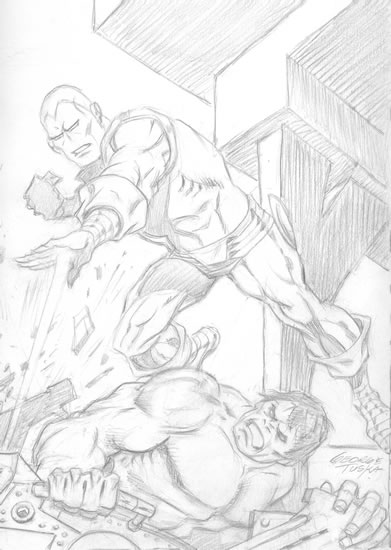The Eisners and the Comics Hall of Fame
Let's kick off today's Comic Art Friday post by congratulating all the nominees for the 2006 Will Eisner Comic Industry Awards. The Eisners are comics' equivalent of the Oscars, recognizing excellence in the field of sequential art. As usual, I haven't read most of the nominated works — only so many hours in the week, plus, not a lot of superhero books make the list — but I have no doubt that all of the nominees are deserving of plaudits.
I always look closely at the Eisners' Comics Hall of Fame nominations, because most of the names are people whose work I know and admire. This year's candidate pool (voters can choose as many as four) contains an august group of worthies. I could make a plausible case for almost every nominee. But if I had a ballot, I'd be throwing my support behind:

Dan Adkins was one of comics' premier inkers beginning in the 1960s and continuing through the '80s. He started his career as an assistant to the legendary Wally Wood, then developed into a stalwart on his own. Adkins's hallmark is a clean, fluid line.
The original pinup above, featuring a nameless young woman packing a pistol, demonstrates Adkins's flawless draftsmanship as well as his expert inking.

George Tuska, whose career in comics began in the late 1930s, was one of the first artists I learned to recognize by sight when I started reading comics. His distinctive and dynamic style has a look all its own.
Tuska is best remembered as the main artist on Iron Man in the early 1970s, though he worked on numerous other series also. Here he pits old Shellhead against his former fellow Avenger, the rampaging Hulk.
I may never be elected to the Bloggers' Hall of Fame, but give me this, friend reader: I make Comic Art Friday happen for you, week after week. That's worth something, isn't it?
I always look closely at the Eisners' Comics Hall of Fame nominations, because most of the names are people whose work I know and admire. This year's candidate pool (voters can choose as many as four) contains an august group of worthies. I could make a plausible case for almost every nominee. But if I had a ballot, I'd be throwing my support behind:
- Matt Baker. His career was relatively brief, and his body of output small in comparison to some others. But in the 1950s, Baker's name was synonymous with what came to be known as "good girl" art. He drew some of the most beautiful female forms and faces that ever graced a comic book page. Every pinup artist working today owes a debt of gratitude to him. Baker was also the first prominent African American artist to work in mainstream comics, though most of those who admired his work during his heyday had no idea that he was black.
- Ramona Fradon. One of the relative handful of female artists who have lent their talents to the superhero genre, Fradon was, like Matt Baker, a pioneer. Her smooth, no-frills style helped define the character of Aquaman for a generation. She also cocreated Metamorpho, the Element Man, and for a decade worked on the Brenda Starr newspaper strip. Hearing Fradon interviewed by fellow artist Scott Shaw! was, for me, one of the highlights of this year's WonderCon.
- Mort Meskin. A phenomenally talented illustrator mostly active during the 1940s and '50s, Meskin could draw anything from superheroes to war stories to jungle adventures to romances. As a result, he never became identified with a single character or series specifically. Meskin's eye for light and shadow was truly amazing. He was also one of the best panel designers of his time.
- Robert Kanigher. One of DC Comics' most prolific writer-editors, he helped shape pretty much every character in the DC Universe into the forms we recognize today, and created or cocreated dozens of familiar heroes and heroines. He wrote the story that introduced the new Flash (Showcase #4, September 1956), ushering in the Silver Age of Comics. Not limited to the superhero genre, Kanigher was also well known for his work in war comics.

Dan Adkins was one of comics' premier inkers beginning in the 1960s and continuing through the '80s. He started his career as an assistant to the legendary Wally Wood, then developed into a stalwart on his own. Adkins's hallmark is a clean, fluid line.
The original pinup above, featuring a nameless young woman packing a pistol, demonstrates Adkins's flawless draftsmanship as well as his expert inking.

George Tuska, whose career in comics began in the late 1930s, was one of the first artists I learned to recognize by sight when I started reading comics. His distinctive and dynamic style has a look all its own.
Tuska is best remembered as the main artist on Iron Man in the early 1970s, though he worked on numerous other series also. Here he pits old Shellhead against his former fellow Avenger, the rampaging Hulk.
I may never be elected to the Bloggers' Hall of Fame, but give me this, friend reader: I make Comic Art Friday happen for you, week after week. That's worth something, isn't it?
Labels: Comic Art Friday









1 insisted on sticking two cents in:
SwanShadow,
I think that this Iron Man/Hulk would look amazing inked and colored. I know that you prefer the true comic art B&W form, but I think that this one would just pop inked & colored even though it stands extremely well as-is.
Post a Comment
<< Home